#rep writes
Explore tagged Tumblr posts
Text
Using "said" is okay
Aka Second Edition of Rep's lil writing tips
Said is the default when nothing else is needed, said is perfectly fine and functional. You don't have to look for synonyms of 'said', in fact you plain shouldn’t search for "synonyms" of said. Dialogue tags are not here just for who's talking, they do a lot more!
When it comes to dialogue tags, the best thing you can do to make them varied yet feel natural is to ask yourself "is there something I want to convey that the dialogue itself can’t?". Like whispering, growling, blurting out, etc... The dialogue tag isn't just to say who’s talking, it's about serving the dialogue and narration! It’s about deepening the dialogue with what the dialogue itself can't say! (So maybe refrain from the "he asked" when there's a question mark since that's the function of a question mark. Same with exclamation marks)
The dialogue tag can play with the tone and volume, they're so fun!
-"Whatever," he grunted
-"Whatever," he sighed
-"Whatever," he muttered
And if you got an exclamation mark, go wild, I love those, I love playing with the volume and tone the dialogue tags do!
-"Go away!" he growled
-"Go away!" he spat
-"Go away!" he yelled
-"Go away!" he screamed
Also lil life hack tip: Since "!?" Is technically not grammatically correct, you got a free dialogue tag right there by removing one of the marks 😎 So instead of:
"What are you talking about!?" he said (or "he exclaimed"/"he asked" which would be repetitive and perhaps a lil awkward since the marks are already saying that)
You can get an easy:
"What are you talking about?" he exclaimed.
^^^ Bam. The dialogue itself couldn’t convey it, so the dialogue tag came along and did it.
And once you've made sure the dialogue line can’t really be deepened by anything, that it doesn't really need anything aside from a tag because it's unclear who's talking: go with said!!! It's a good dialogue tag! Super functional, go nuts!!!
So instead of asking yourself "what synonyms are there to 'said'", ask yourself if your dialogue could use a lil extra word to convey the feelings, speed, and tone more clearly! If you ask yourself this new question you'll never worry about overusing said again!
And have fun exploring what dialogue tags can do for your dialogues!!!
Bonus: Using actions as a "tag" works too! Like:
-“I don't know,” he shrugged.
-He shrugged. “I don’t know.”
(I like to use the latter with the name, I usually use it when it needs to be extra clear who's talking before the reader can put a voice to the dialogue, like a group setting, was very useful while writing At Hope’s End)
Because sometimes you don't feel the need to convey a tone, but a feeling that's better shown a lil out of dialogue. Maybe they turn away as they say it, maybe they hurriedly take a bite of food to stop talking so their voice doesn't crack, maybe they're unimpressed and cross their arms, or maybe you just want to exploit the "this is a tavern" setting and make a character sip a beer for setting purposes, lots of possibilities here too!
Dialogue tags serve the dialogue, but they also serve the narration! Up to you to decide what exactly you want it to serve!
30 notes
·
View notes
Text
Represention of Autistic Frustration in Laios Dungeon Meshi
Like many other autistic people, I related strongly to Laios Touden while reading Dungeon Meshi. This post isn't going to spend time disputing whether he displays autistic traits or not—while I could do that, I want to focus on why specifically his portrayal struck a chord with me in a way the writing of most other autistic-coded characters has not.
Disclaimer: as the above suggests, this post is strongly informed by my own experiences as an autistic person, as well as the experiences of my neurodivergent friends with whom I have spoken about this subject. I want to clarify that in no way am I asserting my personal experience to be some Universal Autistic Experience. This post is about why Laios' character feels distinct and significant to me in regard to autistic representation, and while I'm at it, I do feel that I have interesting things to say about autistic representation in media generally. This also got a bit long, so I'm sticking it under a read more. Spoilers for up to the end of chapter 88 below.
The thing that stands out most to me in regard to Laios' characterisation is the open anger he displays when someone points out his inability to read other people. This comes up prominently in his interactions with "Shuro" (Toshiro Nakamoto):
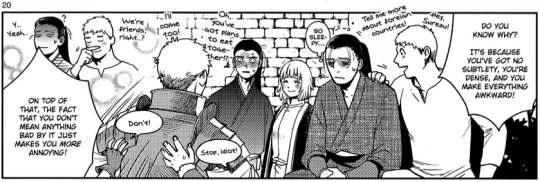
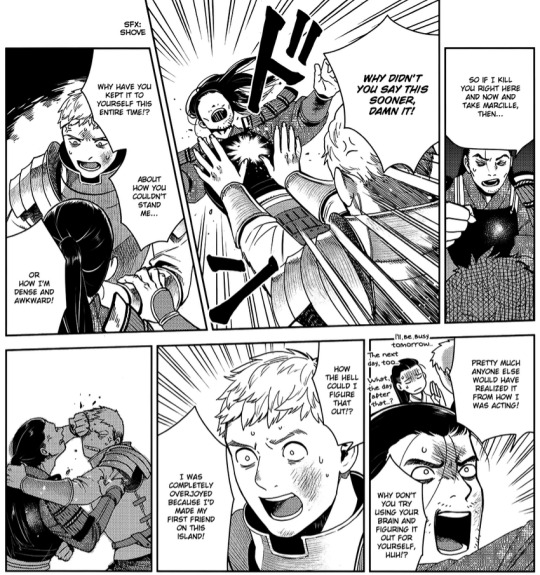
The frustration pictured above (Laios continuing to physically tussle with Toshiro, using crude language toward him) becomes even more notable when you remember that this is Laios, who, outside of these interactions, is not easily fazed and often exists as a lighthearted contrast to the rest of the cast. Then we get to Laios' nightmare.
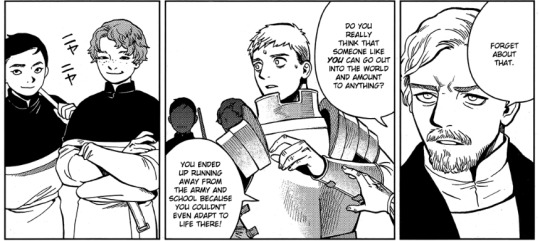

In Falin's words: "Nightmares love emotional wounds. Wounds you hold in your heart. Things that give you stress, or things that were traumatic for you. They aggravate memories like that and cause the dreamer to have terrible dreams." (chapter 42, page 10.) (damn. i'm properly citing for this post and everything.)
Thus, Laios' nightmare establishes an important fact: even if he is unable to recognise social blunders while he's making them, he's at least subconsciously aware that other people operate on a different wavelength to him, and that he's an outsider in many of his social circles (both past and present). His dream-father's disparaging words stress the impact this has had upon his ability to live up to the expectations set out for him, and we also get a panel of kids who smirk at him (presumably former bullies to some degree). Toshiro's appearance only hammers home how much Laios is still both humiliated and angered by his misunderstanding of their relationship.
I've thought a lot about anger as concomitant to the autistic experience. When autistic representation portrays ostracization, it's generally from an angle of the autistic character being upset at how conforming to neurotypical norms doesn't come easily to them; as a result, they express a desire to 'get better' at meeting neurotypical standards, a desire to become more 'normal' (whether the writing implies this is a good thing or not). In contrast, not once does Laios go, "I need to perform better in my social interactions, and try to care less about monsters, because that's what other people find weird." His frustration is directed outward rather than inward, and as a result, it's the people around him who are framed as nonsensical.
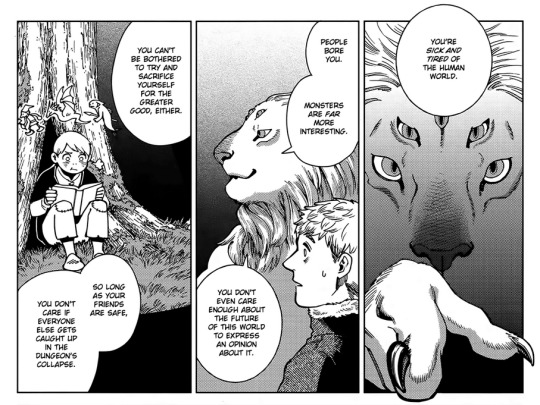
The Winged Lion starts delineating Laios' anger, and Laios' reaction is to think to himself, "It can sense all my thoughts, huh?" (chapter 88, page 16.) This is the scene that really resonated with me. I'm not saying I have never felt the desire to conform to neurotypical norms that is borne from insecurity, but primarily, I know that I don't want to work toward becoming 'normal'—I don't want to change myself for people who follow rules I find nonsensical. It's the difference between, "Oh god, why can't I get it," and, "WHY CAN'T YOU GET IT?" (phrasing here courtesy of my friend Miles @dogwoodbite). And for me personally, Dungeon Meshi is the first time I've seen this frustration and the resultant voluntary isolation from other people portrayed in media so candidly. Laios' anger is not downplayed or written to be easily palatable, either.
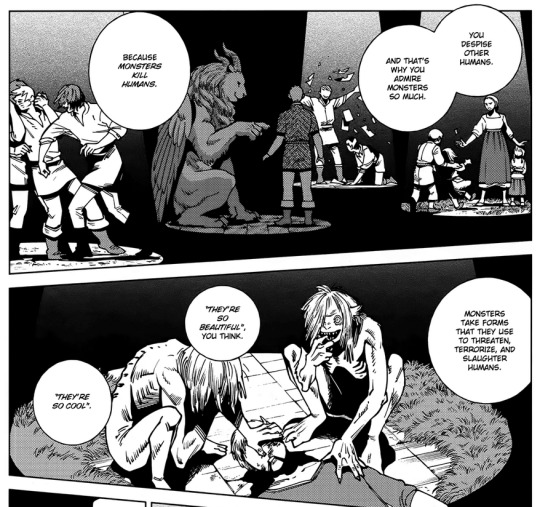
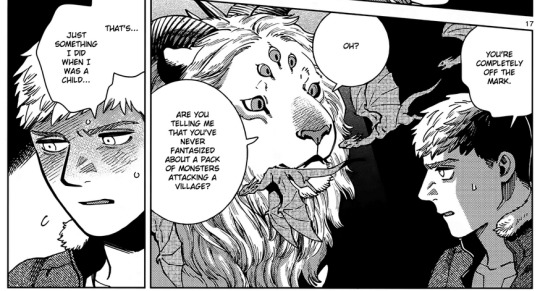
The culmination of Laios' frustrations in this scene wherein we learn that Laios has fantasised about "a pack of monsters attacking a village" drives home just how alienated he really feels. I need not go into his wish to become a monster himself, redolent of how many autistic people identify/have identified with non-humans to some degree as a result of a percieved disconnect from society (when I was younger, I wanted to be a robot. I still kind of do.)
Obviously, wishing death upon other people is a weighty thing, but the unfiltered nature of this page is what deeply resonated with me. The Winged Lion is laying Laios' deepest and most transgressive desires bare, and they are desires that are a product of lifelong ostracization by others (whether intentional or unintentional). This is the brand of anger I'm familiar with, and that my neurodivergent friends express being familiar with, but that I haven't seen portrayed in writing so explicitly before—in fact, it surprised me because most well-meaning autistic representation I've experienced veers toward infantilisation in trying make the autistic character's struggles easy for neurotypicals to sympathise with.
Let's also not neglect the symbolism inherent to Laios' daydream. "A pack of monsters attacking a village". Functionally, monsters are Laios' special interest—he percieves everything first and foremost through his passion for monsters. His daydream of monsters attacking—killing—humans, is fundamentally a daydream of the world he understands (monsters) overthrowing the world that is so illogical to him, that has repeatedly shunned him (other people). I joked to my friends that it's an autistic power fantasy, and it actually sort of is. And in it, his identity is aligned with that of the monsters, while his anger manifests in a palpable dissociation from the rest of humanity. This is one manga page. It's brief. It's also very, very raw to me. I think about it often.
To conclude, I love Laios Dungeon Meshi. This portrayal of open frustration in an autistic character meant a lot to me, and I hope I've sufficiently outlined why. Also, feel free to recommend media with autistic representation in the notes if you've read this far—I would really like to see if there is more of this nature. Thank you for reading. I'm very tired and should probably sleep now.
#dungeon meshi#dunmeshi#laios touden#shuro#toshiro nakamoto#the winged lion#autistic#autism#clay writes#i GUESS#this was so spur of the moment. im so busy right now i dont have time to be analysing laios touden#i wuont angry autistic rep..
10K notes
·
View notes
Note
What comic is the bottom left image of springtrap from? (On the post where you say why you draw him blocky)
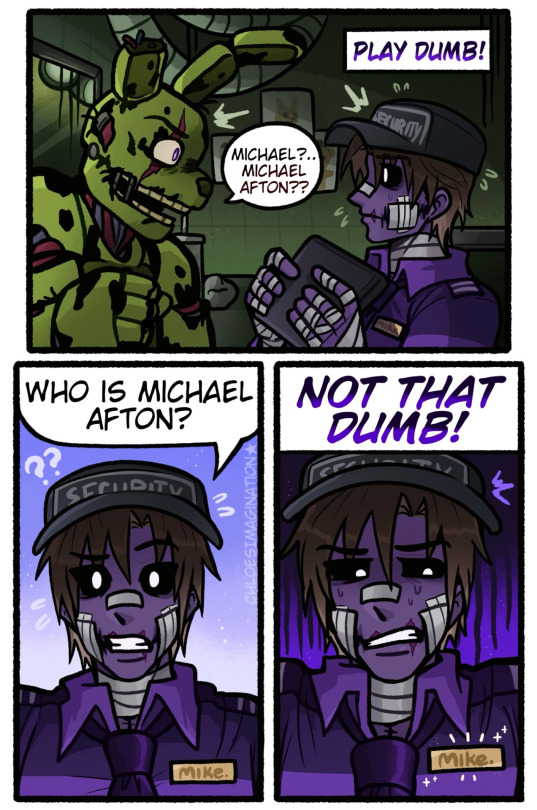
It’s from this comic!! A very normal father son reunion
Og post here
#ask reply#I still love this comic#THE backgrounds how both Springtrap and Michael looks??? perfect peak love#I gotta do more jokes around fnaf 3#mostly because I love the setting of Fazbear frights itself!#a fnaf horror attraction in universe is just so cool#phone dude is cool#I love how Michael was probably at Fazbear frights for awhile too#seeing phone dude says ‘welcome back’#and the survival logbook just heavily implies Michael was writing in it during that game#with all the foxy drawings repping Michael and all#ITS JUST overall a cool location with many interesting details#maybe I should draw Hudson and Michael being coworkers sometime#all three phone dude Hudson and Michael being buddies pff#no promises but imagine 🩵🩵 maybe 🩵#shout out to fnaf 3 enjoyers 💚
3K notes
·
View notes
Text










The Lord of the Rings: The Rings of Power
Míriel + Elendil + Flourishing Touch
#It escalated SO fast after she got blinded IMO partly because of that but Miriel almost always starts any touching..#.. and Elendil almost always goes RIGHT for the hand bro trained himself into it from leading her everywhere - she's also the one escalatin#ABSOLUTELY WILD WRITING AND ACTING CHOICES WHEW I'M LOVE IT#I'm pretty sure this is every instance shown as of 2x06 except the first time she puts her hand on his chest which is repped by gif 6#mirendil#Elendil#Miriel#tar miriel#Tar-Míriel#trop#rop#trop spoilers#the rings of power#miriel x elendil#elendil x miriel#tropgifs#trop gifs#Queen Miriel#rings of power#tropedit#lotr trop#lloyd owen#cynthia addai robinson#TROP#ROP
992 notes
·
View notes
Text
The Many Languages of Dick Grayson
Apparently, according to Nightwing #54, he can speak 12, so I went on a little quest to see just how many I could identify.
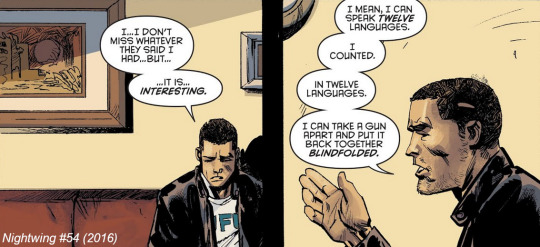
Starting off with The Essential Batman Encyclopedia, the entry for Dick Grayson lists him as being trained in French, Spanish, Russian, Japanese, Mandarin, and Cantonese with having some proficiency in an unknown Romani dialect. Given there are multiple examples of him speaking these languages throughout the comics, I am inclined to trust this claim. To start, we've got several examples of French (Gotham Knights #14, Detective Comics Annual #12, Nightwing #73, Grayson #10-- also featuring Spanish)
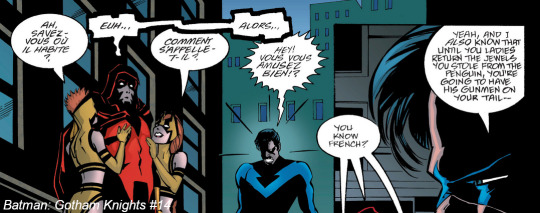
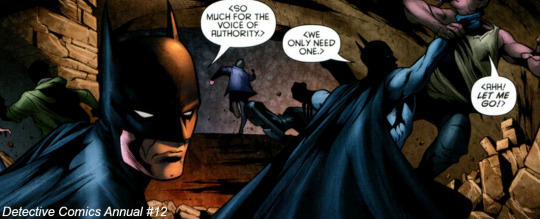
In Grayson #1 he speaks Russian only briefly, but in Detective Comics #36 he speaks it throughout.
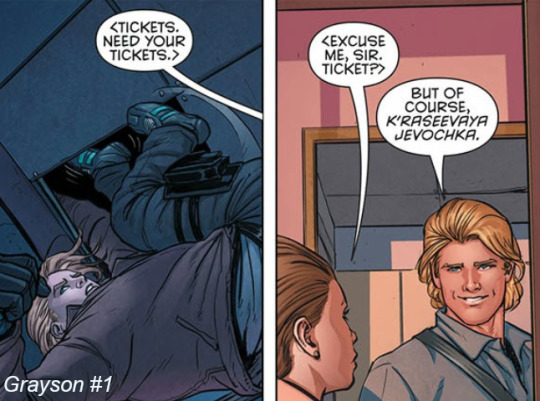
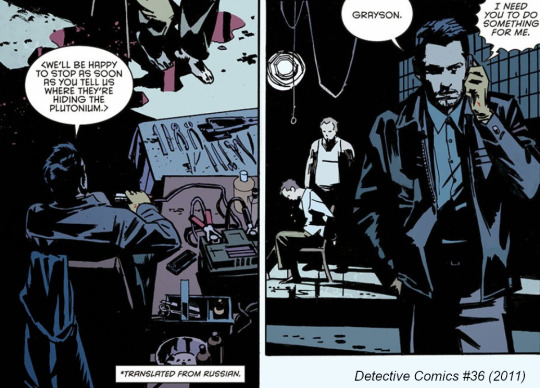
As far as the Chinese languages go, while I believe Dick can speak Mandarin and/or Cantonese fairly well (Batman/Superman World's Finest #3), his Hanzi recognition and literacy could use some work.
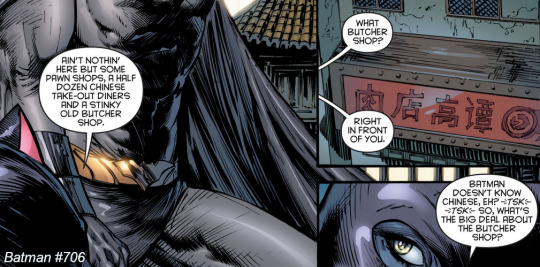
Similarly, when the Titans head off to Japan in Titans Annual #1, we have Nightwing speaking Japanese in battle; however, when it comes to the prospective job of being a manga translator in Nightwing #125, he claims he doesn't know Japanese, which leads me to believe he is only proficient in speaking Japanese/Chinese and struggles with the writing systems.

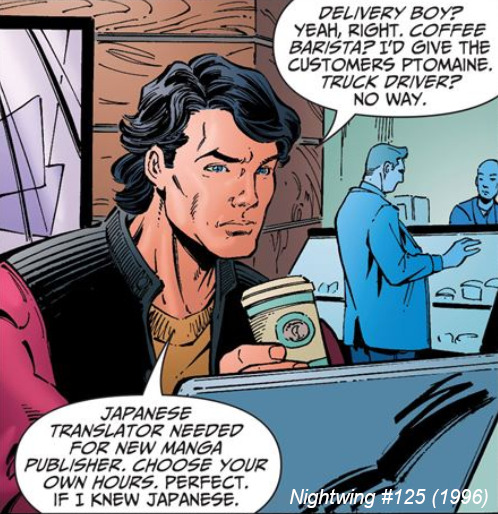
So what about the languages not covered in the encyclopedia? To start, we have another romance language: Italian (Nightwing #72).
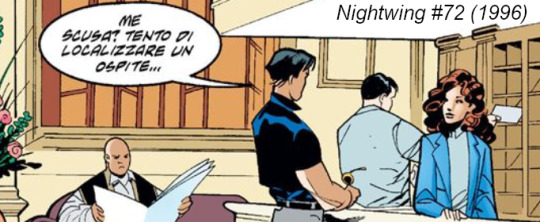
Followed by some alleged German (Nightwing #51, JLA #44)
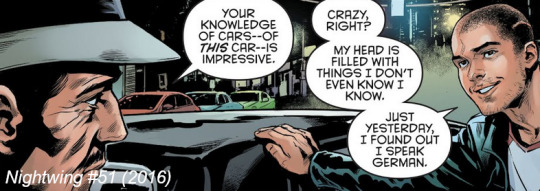
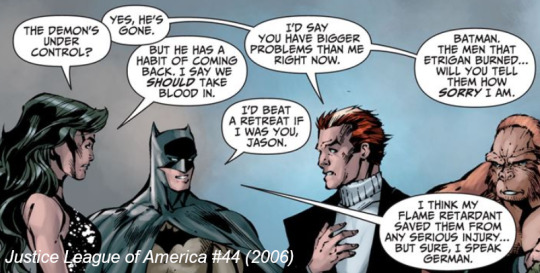
And conversations in Farsi (Robin #175)

While I've seen some Tumblr and Reddit posts claim he knows Kikuyu, The Power Company: Manhunter #1 only says he "brushed up" on his Kikuyu before going to Kenya, so it is unknown how much of the language he actually speaks, but to me it doesn't seem likely to be a lot.

He also, to some unknown degree, speaks Tamaranean-- at least enough to hack into an alien computer (Action Comics #842).
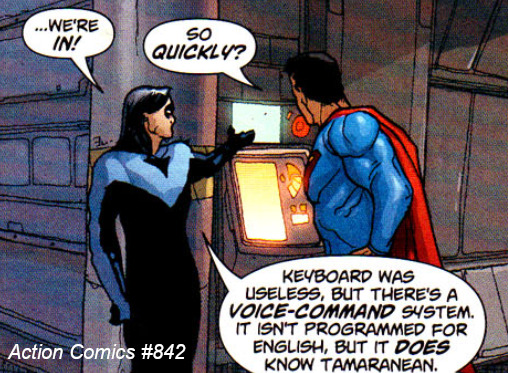
As far as unspoken languages go, Dick is fluent in ASL, which is proven numerous times when he communicates with Jericho (New Teen Titans 1984).

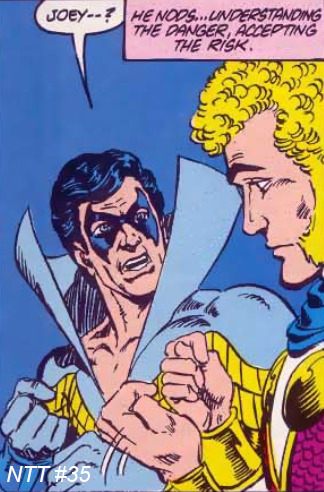
And lastly, the two languages that remain rather uncertain are Romani and Cant-- largely due to the nature of the languages themselves and their representation in comics. "Romani," for instance, has several different dialects, and when Devin Grayson introduced it for Dick (Gotham Knights #20-21, Nightwing #91), she never specified which, and based on the lines she wrote, her research into the language was questionable at best. Writers since have recognized Dick's Romani heritage, but have not otherwise suggested he retained much of the language to be considered fluent.
Cant is an even wider term than Romani and can be seen as more of jargon for a particular language than a language itself, sometimes even being called a "pseudo-language." The colloquial term for American circus cant is Carny, or "Carny speak" as Boston Brand puts it in Batman: The Brave and the Bold #14 when he and Nightwing encounter a kid who speaks it.
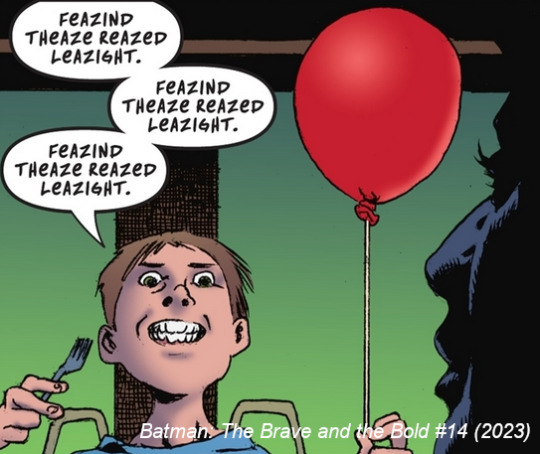
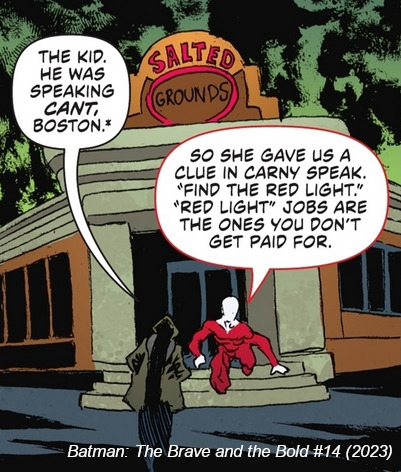
So... this leaves us with 11 languages Dick has notable proficiency in: English, French, Spanish, Italian, Russian, German, Japanese, Mandarin, Cantonese, Farsi, and ASL. And ~3 languages he has unknown proficiency in: Tamaranean, Kikuyu, Romani, and Carny/Cant (if you want to count it).
Maybe memory-loss Dick was including either Tamaranean or Kikuyu in that count from Nightwing #54, or maybe he knows some other language we haven't seen yet. Given how close the family is to the Al Ghuls, I personally think it would be cool if one of them was Arabic.
But anyway, hope you enjoyed this post! A lot I've seen covering this topic are very surface-level and label some of his more iffy languages as "fluent," so I hope this cleared things up. I've read tons of Nightwing, and I swear there are more examples, but sifting through the 1,000+ comics I've read of him is a lot haha. If y'all know of some others, let me know!
#nightwing#dick grayson#romani dick grayson#boy wonder#first robin#language#polyglot character#multilingual character#dc comics#i tried to keep the romani and carny part brief#you could write a whole essay on the languages#i could also write a whole essay on devin grayson's romani rep#or lack thereof#and its problematic nature#but that's a post for another day
531 notes
·
View notes
Text
The thing abt john winchester is that he is too complex for the majority of the spn fandom and for a good portion of the writers on the show too.
Because at his core john is about love over everything else. When he looks up at his sons (yes, up, the fact that they’re both taller than him>>>>>), there is love seeping achingly from every single pore of his being even as he abuses them, as he destroys their souls beyond belief. He does it all entirely out of love. And he is so, so wrong for it. A part of him knows it. But he wants to keep dean alive, and he wants to keep Sam pure. And he loves them so much. And he damages them so horribly. John Winchester is the foundation upon which they are both built, they only become more of what he made them as the series goes on. Sam stops fighting it, Dean continues to mold into his image no matter how hard he tries to fight it.
Hell puts them both on steroids, but their individual trauma responses that influence this are the foundations that John built into them. No wonder azazel wanted sam to win so badly. John Winchester crafted his sons into alastair and Lucifer’s ideal victims, respectively, and dean was a better (worse) john than John ever was. John held out in hell. Dean acquiesced to his abuser despite all of his efforts to fight him, and he’s never been the same since.
Sam fought like hell, and he fought destiny, but at his core, he did what John always wanted him to by doing what dean wanted him to do, and then he stops fighting at all, loses the fire he showed john in adolescence that john immediately notices when he returns in s14.
And the sad thing is. They filled their roles so well that John is saddened by what they’ve become. He didn’t want dean to break. He didn’t want Sam to be dimmed. He’s sad to see what Sam is like in s14. In the process of recovering his wife, he ensured he would mold his sons into what he wanted them to be, and when he got what he wanted, he was devastated.
John Winchester is so driven by love and grief and he’s so filled to the brim with both that it’s painful to watch him on screen because he destroyed his family because of it. And he wanted this all along but he didn’t realize what he’d have to give up to get it.
#supernatural#john winchester#sam winchester#dean winchester#my meta#honestly the thing is#if john had survived past s2#I don’t think he would get the hate he receives today#bc the thing is. jdms portrayal is ridiculously complex and beautiful#that when the majority of people write him they lose all his nuance#the fact that John was gone more than he was there immensely damaged his rep in the eyes of the fandom#I think if John were alive for longer he would get similar treatment to dean#both narratively and fandom perception wise#he already does to some extent amongst some people#he’s an excellent complex character#but people can’t handle complex#that man is an abuser#that man also loves more deeply than anyone#you know who also fits those descriptors?#dean#and look how fandom views him
446 notes
·
View notes
Text
We don't talk enough about the fact that Amelia Pond, s5 Amelia Pond, before the timeline is reset, isn't just a normal orphan. Her parents didn't die, didn't abandon her, and didn't send her away. They never existed in the first place.
And if her parents never existed, then Amelia cannot exist. She is a causal impossibility.
"People fall out of the world sometimes, but they always leave traces." A photograph. A face carved into an apple. Yes. Sure.
A child.
Now that's too big, surely.
But that's what she is. She is exactly the same as these things. A trace. An echo of something that could never be, never was, never could have been.
And the universe should never allow it. A whole person, that's just too much. She could not have continued to exist indefinitely, in normal circumstances, after her parents never existed.
In normal circumstances.
Because the Doctor didn't just save her from things coming out of the crack in her wall. He saved her from going into it. And he didn't just save her from the threat of going into it simply because of its vicinity.
No, by arriving when he did, he interrupted a process that was probably already in motion. And then by arriving again only moments later on a cosmic relative timestream (too quickly for the process to complete) and yet in the local relative timestream, years later --- years of a potential future caught midway through the process of rewriting -- he solidified that existence. Amy is a creature from another timeline, caught in amber. The Doctor prevented her from never existing, but only after she could already never exist.
And so, no one around Amelia thinks about it. Neither does she. There's some kind of consciousness block, because if you thought about it, really thought about it, for two seconds you'd realize she cannot exist. And the human mind can't deal with that. So, to protect itself, everyone's brain simply slides off it before ever noticing. They just assume that her existence makes sense, and don't question it, and don't notice what they don't question, that is staring them in the face.
But of course, to some extent they do notice. They can't think it, but they notice subconsciously that there's something they can't think. They notice there's something wrong with her, something uncanny. And they don't like it, and they alienate her even more because of it.
"Does it ever bother you Pond that your life existence doesn't make any sense?"
#like!!!!!! why arent we talking about this!!!!!!!#amelia pond#amy pond#the ultimate autism metaphor on top of being autistic anyway#doctor who#dw#ndw#dw theory#lavender thoughts#SHE CAN'T EXIST SHE IS LITERALLY IMPOSSIBLE#you called clara the impossible girl but that's amy#and THEN the fact that even after it's all set right#she remains shaped by -- remains deeply traumatized by -- a timeline that never happened; a reality that never was#AUGH !!!!!#some wounds just can't heal even if the thing that caused them never existed in the first place#some wounds remain as a TRACE of the other time just as you yourself were once#THE mental illness rep of all time#and in the big bang of course the doctor had to take the shortcut because if they'd all gone the long way round#she'd have been gone before he got there#as starless universe's little amelia disappeared.... it could be millienia but from another perspective it HAD to be moments#they made it only in the nick of time#and the doctor knew that#pond#the life and times of amy pond#lavender writings
888 notes
·
View notes
Text
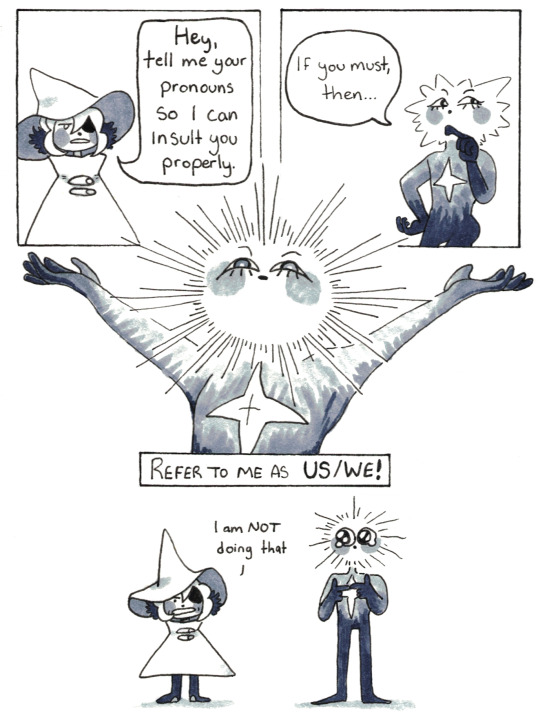
Reasons to play In Stars and Time: Canon Pronoun Warfare.
#in stars and time#ISAT#Siffrin#Loop#Context: early on you meet a character who tries to get you to use the royal We pronoun for them and you shut them down. It's great.#The gender swag and non-binary rep in this game is lovely.#I sketched this out when I was in Act 2 - and as of posting this I have not yet finished the game so *please* no spoilers.#It is rare for me to get into something spoiler free and I have been getting my shit rocked by this game in the best way.#Yes I *am* taking another detour to talk about a video game I love again. I will have some fun crossovers. Trust the process.#I will also do my best to pitch this game as spoiler free as possible. Because you *should* play this game:#ISAT is a very lovingly crafted RPG with very fun and emotional writing.#The characters are great and the mysteries you slowly uncover are intriguing!#The way the gameplay ties into the player's own emotional state is nearly always in sync with the protagonist. You *will* feel things.#And it is not afraid to let those things be hard emotions! Do mind the content warnings and know your limits though.#As someone who sucks at video games I also appreciate that it is so generous with your time and keeps things fun.#Not to mention it is honestly underpriced for the amount of content in it. Buy this game. I need to spread the brainworms.
1K notes
·
View notes
Note
sellllllll it's meeeeee. hehehehehehehehehhehe
so for ur writing exercises.... deku + light? please? pretty please?
:3c
heheh heheh hehe niku. this will be the death of me. me writing izuku for the first time 🥲 i will only do this for you </3
contains: established relationship, spoilers for the end of the manga, aged up deku but sometime in between the final outcome (he doesn't get the h*** s*** from bakugo yet), mentions of sex and scars
deku + light
izuku only sleeps with the lights off.
it isn't uncommon; many people you know can't sleep with even just a sliver of light turned on somewhere in the room. but the difference with izuku, you learn, is not that he's unable to stand the light―it's that he refuses to.
you quickly pick up on it the first few times he sleeps over.
he fidgets in bed, pretty badly, actually. the nightlight you sleep with glows a warm yellow, illuminating the side of your face and coating him in its afterglow. you chalk it up to nerves, how he pulls at his sleeves and adjusts his position constantly; he is, after all, one of the most anxious people you know.
and this relationship―it's new. heck, even you feel a little jittery with his arm wrapped around you.
the rhythmic tapping on your hip only increases pace. you don't think he realizes it, so your hand gently reaches for his, intertwining your fingers as you turn around in his arms.
he's close, nearly touching you nose-to-nose; the proximity leaves you fuzzy, a little ticklish, so you giggle, a soft "oops," as the freckles dusting his face almost glisten under the warm light.
"hi," you whisper, meeting his eyes; they stare back at you wide in surprise, "can't sleep?"
he looks almost guilty at your question, as if you’ve caught him with the one thing he's been trying to keep from you.
"just—" his voice comes out louder than intended, prompting him to chuckle nervously as he readjusts his volume, "just winding down, sorry."
you inch closer, nuzzling his nose lightly, "it's okay."
"did i wake you?" he asks, cheeks flushing pink as his eyebrows furrow in immediate concern. his expression is something caught between stifling a grin and feeling sorry.
you shake your head against the pillow you share, strands of your hair tangling with his. "just winding down," you tease, watching as his gaze turns softer, eyelids drooping heavier.
sometimes, you think, izuku holds the world in his eyes―a deep, dark green, the color of life. most times, they look at you with wonderment, bright and alive; photos from inko tell you they're the eyes of his inner child.
on nights like this one, however, they hide a depth in them weighted by what you can only assume is time, and all that has happened to him in such a short span of it.
you try your best to understand what lies beneath them, knowing full well he'll never tell you outright what truly bothers him.
"is it the light?" you bring up, some time after laying in silence.
"hm?" he clarifies.
"do you have a hard time sleeping with the nightlight?"
his eyes widen briefly once more, as if shocked that you've caught him again. these split second reactions are ones you've learned to be attentive to when it comes to izuku.
"no," he tries to lie, but you know better as you turn to your nightstand and reach for its switch, "you don't–"
"it was hurting my eyes," you quickly make up an excuse, tucking yourself closer under his chin as you cut off his attempt to deny it again.
finding out that the light was the problem was the easy part—
you'd begun to notice much earlier on that izuku was barely rested on the nights he'd spend at your place. it was only when your old nightlight broke that you began to notice him waking up much later than you did, groggily rousing from a deep sleep.
—what was hard, was figuring out why.
at first, you suspected it was his scars.
"s-sorry, it's not—" he'd warned you, right as your hands gripped the hem of his shirt the first time you were about to have sex, "—it's not nice."
you didn't care though; you still don't care, and you've made that abundantly clear to him since. you love izuku and all his parts―all the nicks and jaggedy pieces of skin that make up who he is.
when you eventually ask him about it, with a request that he be honest with you for once, he tells you that it is and it isn't―the reason why he exclusively sleeps with the lights off, that is.
it's an odd, comforting relationship he has with his body—that he is simultaneously grateful and sorry for how its become a canvas, both painted and marred to symbolize japan’s historic last stand.
you find out the real reason when you catch him staring at his hands.
he does it often, when he thinks you aren't looking—his fists bunched up in the same way he used to watch the power of one for all course through his fingertips; the same way he used to prepare them in battle.
there’s a faraway look in his eyes that lingers, you notice—a little wistful if anything.
“do you miss it?” you finally ask. he gives you the same shocked look he does every time, as if he’s been caught with a secret he’s been trying to hide.
he’s learned a fair bit about you now, too, though—lying to you is futile when you’ve perfected reading his truth. he stares at his fists again as you take a seat beside him, moving to give you space. you rest your head on his shoulder gently, waiting.
“sometimes,” he admits, but you know it’s an understatement.
“i think about the vestiges a lot. i miss them the most, i think,” he continues, clenching his fists tightly, “i always try to reach out to them, but i guess it doesn’t work that way.”
“i… i try to replicate the right conditions every night, but…” then he lets go, stretching his fingers out wide. the scars on the surface ripple through his skin, telling its own story.
you hum, acknowledging what he means. silence sits with the two of you as you take his hand in yours, slowly unfurling his fingers until his palm reveals itself to you. it’s rough to the touch, seasoned with hard work and all that he’s been through.
“is that why you prefer the dark?” you ask softly, after some time.
it's not often that you stay up later than izuku does. when you do though, you catch him shifting in bed, moving from side-to-side. you pretend you aren't awake, but you hear him mumble their names, dwindling in volume as he dozes off to sleep.
he stares at his palm for a moment before he admits quietly, "yeah." his brows furrow as if contemplating whether to say more, but he shakes his head, dark green strands swaying to the beat of his embarrassed chuckle, "nevermind, it's silly."
"it's not."
you intertwine your fingers, sandwiching his hand between yours. a slight sheen glosses over his eyes as he tilts his head up to look at you. he draws in a breath, before it spills over.
"it's..." he finds the words, and you squeeze his hand in comfort, "it's easier to believe it was all real when the lights are out, and that maybe it can happen again."
#deku x reader#izuku x reader#midoriya x reader#bnha x reader#shotorus.workbook#it is here ! the first time ive ever written izuku ! i hope u like it niku !#idt i'll ever feel like anything i write of him will be enough but i tried !#SPOILERS FOR MANGA ENDING PLS DONT READ AHEAD#some stuff abt the blurb: i see this happening in the time between him losing ofa and before getting the suit from bakugo#so somewhere between when hes teaching#and i think its a lot of complex feelings ― he's happy he did what he had to do but is also mourning the loss of something he once had#i don't think i can ever convey that feeling fully but i hope i at least managed to touch on it here with him !#i see this as like . the period in his life where he's transitioning out of something he once knew into smth else entirely#i also hc reader to be his colleague (like a teacher or smth) but anyone closely related to the job would work !#really just someone who has a base level understanding of what he went through but doesnt know everything#which is why they're still trying to learn all these things abt him and read him better#and also why he tries to hide a lot of things from them still / is hesitant to share in fear of scaring them away smth like that !#thats all i can think of for now but ill let u know if i have other thoughts on this later on ! hehe#hope u enjoy niku !#ask#rep#ask game answered#most nervewracking experience of my LIFE writing him#stellamancer#niku.🥩
188 notes
·
View notes
Note
Do you intentionally write Zuko super autistic or does that just happen?
This is like asking if I'm intentionally self-diagnosing
#me: writes a relatable Zuko#readers: thanks for the autism rep!#me:#me: the what now#avatar the last airbender#atla#Zuko
1K notes
·
View notes
Text
actually there's a huge difference between queerbaiting/"Hey guys look how gay these two are haha they're definitely gonna end up together, give us views uwu oh- never mind oops they're going to superhell" and "Hey it's 2004-2012 and there's no way we can get away with having our protags/main couple be two gay men but we really want to show these two are soulmates so we'll do it through subtext and underlying messages and by literally telling you over and over again their relationship is the most stable and important in the entire show, and the ending will imply they lived and died together", and it's insane that some of yall don't see how these two are not the same fucking thing.
#saw a very Shit Take about hilson earlier and im like. hm. some of yall have no idea what gay rep was like before 2016ish and it shows!#i feel like usa queer ppl have forgotten that this is actually still the norm about queer rep in most non-USA places#or are young enough/new enough in fandom that they dont know this was actually the most we'd get at the time#like if it was queerbaiting it would eventually be played as a joke Haha No Homo#but it wasnt. like. their relationship was shown to be THE most stable and important one in both their lives & the show overall#they literally destroyed their LIVES to be with each other. repeatedly.#anyway i could write an entire 10 page thesis on the matter but i have an actual exam in three hrs so. another time#house md#hilson#greg house#james wilson#gregory house#house x wilson
2K notes
·
View notes
Text
Now that I got to heal a bit from my burnout and get chapter 20 done, here’s a new chapter! Enjoy <3
16 notes
·
View notes
Text
This isn't targeted at anyone in specific, in fact most of the fanartists in the fandom do not have this issue, which I love and am so relieved to see, but please, for the love of god, draw Sammy plus/mid size.
Sammy is some of the only plus/mid sized rep I've seen in tv that puts ZERO emphasis on the "comedic relief" of her being bigger than the other characters, she's a badass woman who knows how to fight and lived through two dinosaur infested islands without her weight playing any negative parts in it, and that is so relievng to see as a plus size person.
Fat people aren't hard to draw, look up references, look up tutorials, there are plenty, hell she's not even that big to the point where it is drastically different than drawing a skinny person (because yes, while I wouldn't say drawing plus sized characters is hard, it is definitely different) but it is so easy to not draw her with a waist smaller than her neck.
#sammy gutierrez#jurassic world chaos theory#camp cretaceous#jurassic world camp cretaceous#camp cretaceous chaos theory#jwcc#jwct#i apologize for the rant#but this has been bugging me#writing wise Sammy is some of the best plus/mid sized rep I've seen in media so to see people drawing her the same size as Brooklynn is#disheartening#to say the least
267 notes
·
View notes
Text
Disability Tropes: The Miracle Cure
The miracle cure is a trope with a pretty negative reputation in disability circles, especially online. It describes a scenario in which, a disabled character, through either magic, advanced technology, divine intervention or some combination of the three, has their disability cured throughout the course of the story. Sometimes this is literally, as in the disability is completely and entirely cured with no strings attached. Other times, it looks like giving an amputee character a prosthetic so advanced that it's basically the same as "the real thing" and that they never take off or have any issue with, or giving the character with a spinal injury an implant that bypasses the physical spine's break, or connects to an exoskeleton that allows them to walk again. Sometimes, it can even look like giving a character some kind of magic item or power that negates the effects of the disability, like what I talked about in my post about "the super-crip" trope. Either way though, the effect is the same: The disability is functionally cured and is no longer an "issue" the author or character has to worry about.
But why would this be a bad thing? In a world with magic or super-advanced tech, if you can cure a character's disability, why wouldn't you?

[ID: a screenshot of Roy mustang from Full metal alchemist Brotherhood, a white man with short black hair in a hospital gown. In the corner of the screen is the hand of another person holding a small red gemstone. /End ID]
Well there's a few reasons. First, lets talk about the purely writing related ones. If you've been around the writing or even media critique communities for a bit, you've likely heard people voicing their frustrations with tropes like "The fake-out death" where a character is either implied to have died, but comes back later, or is explicitly shown to be dead and then resurrected. Often when this happens in media, it leaves the audience feeling cheated and like a character's actions and choices don't really matter if even the worst mistakes and consequences can be undone. In the case of the latter situation, where they die and are brought back, it can make the stakes of the whole story feel a lot lower, since even something like death is shown to be reversible, so the audience doesn't really have to worry about anything bad happening to their favourite character, and once you've used this trope one time, people will constantly wonder why you wouldn't use it every time it comes up.
The same is true for "fixing" a character's disability. It sets a precedent that even things as big and life-changing as disability aren't permanent in this setting. We don't have to worry about anything major happening to the characters, there's no risks associated with their actions if it can all be undone, and it will lower the stakes of the story for your audience. Personally, I also feel like it's often used as a cop-out. Like writers wanted to include a major injury the leads to something big like disability for shock value, but weren't sure how to actually deal with it afterwards, so they just made it go away. Even in cases where the character start the story with a disability and are cured, this can still cause issues with your story's stakes, because again, once we've seen you do it once, we know its possible, so we won't feel the need to worry about anything being permanent.
Ok, so that's the purely writing related reasons, but what if that situation doesn't apply to the story you're writing? What if they're "fixed" right at the end, or the way they're cured is really rare, so it can't be used multiple times?
I'm glad you asked, because no, this is far from the only reason to avoid the trope! In my opinion, the more important reason to avoid it is because of how the a lot of the disabled community feels about the miracle cure trope, and the ideas about disability it can perpetuate if you're not very, very careful.
You might have noticed that throughout this post, I've put words like "cured" and "fixed" in quotes, and that's because not every disabled person wants a cure or feels like their ideal to strive for is able-bodied and neurotypical. For many of us, we have come to see our disabilities as part of us, as part of our identities and our sense of self, the same way I, as a queer person might see my queerness as a part of my identity. This is an especially common view among people who were born with their disability or who had them from a young age, since this is all they've ever really known, or who's disability impacts the way they think, perceive and process the world around them, how they communicate with people or in communities who have a long history of forced conformity and erasure such as the autism and deaf communities. Many disabilities have such massive impacts on our lives that we literally wouldn't be who we are today if they were taken away. So often though, when non-disabled people write disabled characters, they assume we'd all take a "cure" in a heart-beat. They assumed we all desire to be just like them again, and this simply isn't the case. Some people absolutely would, and there's nothing wrong with that, but it's not as universal as media representation makes it out to be.
Another reason it's so heavily disliked is because this trope is often used in conjunction with other ableist and harmful tropes or it's used in ways that perpetuate misinformation about living with a disability and it can have ableist implications, even if that's not what the author necessarily intended.
If the miracle cure is used right at the end of the story for example, as a way to give characters a happy ending it can imply that the only way for a disabled character to be happy in the long run, is for them to be "fixed", especially if they were miserable all the way up until that point. If it's used earlier in the story as a way to get said character back into the action, it can also be read as the author thinking that disabled people can't be of use to the plot, and so the only way to keep them around is to "fix" them.
Of course, there's also the fact that some authors and writers will also play up how bad being disabled is in order to show why a cure is justified, playing into the "sad disabled person" trope in the process, which is pretty much what it says on the tin. Don't get me wrong, this isn't to say that being disabled is all easy-breezy, there are never any hard days and you should never show your character struggling, not at all, the "sad disabled person" trope has it's place (even if I personally am not a fan on it), but when both the "sad disabled person" trope and the miracle cure trope are used together, it's not a great look.
This is especially bad when the very thing that cures the disability, or perhaps the quest the heroes need to go on to get it, is shown to be harmful to others or the disabled person themselves. Portraying living with a disability as something so bad that it justifies hurting others, putting others at risk, loosing yourself or killing yourself in order to achieve this cure perpetuates the already harmful idea that disability is a fate worse than death, and anything is justified to avoid it.
I've also noticed the reasons the authors and writers give for wanting to cure their characters are very frequently based on stereotypes, a lack of research in to the actual limits of a person's disability and a lack of understanding. One story I recall reading years ago made sure to tell you how miserable it's main character, a former cyclist, was because he'd been in a car accident where he'd lost his arm, and now couldn't ride bikes anymore, seemingly unaware of the fact arm amputees can, in fact, ride bikes. There are several whole sports centred around it, and even entire companies dedicated to making prosthetic hands specifically for riding bikes. but no, the only way for this to resolve and for him to be happy was to give him his arm back as a magical Christmas miracle! It would be one thing if the story had acknowledged that he'd tried cycling again but just had difficulties with it, or something was stopping him from being able to do it like not being able to wear the required prosthetic or something, but it really did seem as though the author was entirely unaware it was even possible, which is an issue when it's the whole point of your story existing. This happens a lot more often than you'd think, and it's very clear when an author hasn't even bothered to google search if their character would be able to do something before deciding the only solution is to take the disability away.
There's also the frustration that comes from being part of an underrepresented minority, finally seeing a character like you on screen or in a book, only for that representation to be taken away. Disabled people make up roughly 16% of the population (though many estimate these numbers are actually much higher), but only about 2.8% of American TV shows and 4.1% of Australian TV shows feature explicitly disabled characters. In 2019, around 2.3% of films featured disabled characters in a speaking roll, and while it's slowly getting better as time goes on, progress on that front is very slow, which is why its so frustrating when we do see characters like ourselves and so much of their stories focus on wishing to be, trying to become or actually being "cured".
An finally, there's the fact this is just a really common trope. Even if we ignore the issues it can cause with your story's tone and stakes, the harm it can do to the community when not handled with care, the negative perceptions it can perpetuate and everything else. It's just a plain-old overdone trope. It shows up so often that I, and a lot of disabled people, are just getting tired of seeing it. Despite everything I've said, there are valid reasons for people to not want to be disabled, and just like how I made sure to emphasise that not everyone wants a cure, it's important to recognise that not everyone would refuse it either. So long as it's not done in a way that implies it's universal, in theory, depicting someone who would want and accept a cure is totally fine. The issue is though that this trope is so common and so overdone that it's starting to feel like it's all we ever see, especially in genres like sci-fi and fantasy (and also Christmas movies for some reason).
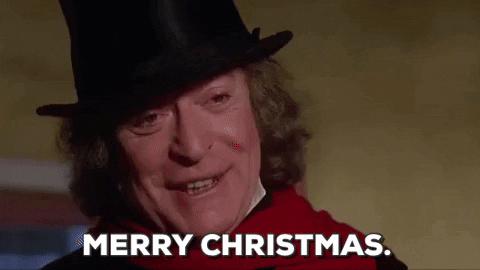
[ID: A Gif of a white man in a top hat nodding his head with the caption "Merry Christmas" down the bottom. /end ID]
Personally, because it's so common, I find even the few examples of the trope used well frustrating, and I honestly feel that it's at the point where it should be avoided entirely where possible.
Ok but Cy, you mentioned there are ways to use this trope well, what are they?
So, like I said, I'm of the opinion that this trope is better off not being in your work at all, but if, for whatever reason, you can't avoid it, or it's use is really that important to the story you want to tell, there are less harmful ways to implement it.
Don't have your only disabled character take the cure
If you really must cure your disabled character's disability, don't make them the only disabled person in the story. Show us another character who, when offered the same cure, chooses not to take it. This at least helps push back a little against the assumption of "of course everyone would want this" that these kinds of stories often imply and doesn't contribute (as much) to disability erasure in the media.
Don't make it a total cure
In real life, there are cures for some disabilities, but they rarely leave no trace. For example, an amputee's limb can sometimes be reattached if it was severed and they received medical treatment fast enough, but it usually results in at least a little nerve damage and difficulties with muscle strength, blood flow or co-ordination in that limb. Often times, these "cures" will fix one issue, but create another. You might not be an amputee anymore, but you're still disabled, just in a different way. You can reflect this in your fictional cures to avoid it feeling like you just wanted to avoid doing the work to write good disabled representation.
Do something interesting with it
I got a comment on my old tumblr or possibly Tik Tok account ages ago talking about their planned use for the miracle cure trope, where their character accepts the cure at the cost of the things that made her life enjoyable post-disability. Prior to accepting the cure, she had found other ways to be independent to some extent and her community and friends helped her bridge the gaps, but they were all taken from her when she was "cured" forcing her into isolation. Kind of like a "be careful what you wish for" sort of thing. The story was meant to be a critique on how society ignores alternative ways of getting the same result and how conforming to other people's ideas of "normal" isn't always what you need to bring you happiness. This was a genuinely interesting way to use the trope I think, and it's a perfect example of taking this trope and twisting it to make an interesting point. If you must use a trope like this, at least use it to say something other than "disability makes me sad so I don't want to think about it too much". Alternatively, on a less serious note, I'm also not entirely opposed to the miracle cure being used for comedy if it fits the tone. The Orville has some issues with it's use of the Miracle Cure trope, but I'd be lying if I said Isaac amputating Gordan's leg as a prank, knowing it could be reversed in a few hours did get a chuckle out of me.
If your villain's motivation is finding a cure for themselves, don't use it as justification for hurting people
Disabled villains need a post all their own honestly, but when a villain's motivation for doing all the terrible things they do is so they don't have to be disabled anymore, it's especially frustrating. Doubly so if the writer's are implying that they're justified in their actions, or at least that their actions are understandable because "who would want to live like that?" Honestly, as a general rule of thumb, avoid making your villains disabled if you aren't disabled yourself (especially if they're your only disabled character), but if they are disabled, don't use the disability as a justification for them hurting people while finding a cure.
So are there any examples currently out there to look at where the trope is used, if not well, at least tolerably?
Yeah, I'd say so, but they're few and far between. Two examples come to mind for me though.
The Dragon Prince:

[ID: A Gif of Ava the Wolf from the Dragon Prince, a light brown, fluffy wolf who is missing her front right leg. /End ID]
The Dragon Prince on Netflix uses the miracle cure twice, but I still really enjoyed the show (at least I did, up until my Netflix subscription ran out, so I've only seen up to season 4). The first time the trope is used in the series, it's actually a fake-out. Two of the main characters, while looking for someone to help them heal the dragon egg they're carrying, encounter a young girl named Ellis and her pet wolf Ava. The two explain their egg is not looking good and they need to find someone to help it, but no one they've found had the knowledge or ability to do anything to help. Ellis says she knows a healer who can help them, and tells them that this healer even restored Ava's amputated leg when she was a pup. When we actually reach this "miracle healer" however, she is revealed to be simply an illusionist. She explains that Ava is still missing her leg, she simply made it look as though she had restored it because Ellis's parents were planning to throw the puppy out, believing it would not survive with its disability and would only be a drain on supplies. This was not actually true and Ava adapted to her amputation very well, she simply needed more time, and hiding her disability and making her appear abled gave her the time she needed to fully recover and adjust. When they return to the healer with the main characters, she removes the illusion and explains why she did it, emphasising that the real problem was never with Ava, but with how people made assumptions about her.
While I do feel it was drawn out a bit too long, I do appreciate the use of the trope as the set up to an overall positive twist. Disability does come with down-sides, it's part of the deal and it would have been nice to see a bit more of that, but for disabilities like amputation in particular, the worst of our problems often come from a lack of adequate support and people's pre-conceived ideas about us, and it was nice to see this reflected, even if it is a little overly simplified.
The second time this trope comes up in the series is when one of the antagonists, Soren, is injured during a fight with a dragon, becoming paralysed from the neck down. His sister, Claudia is absolutely beside herself, believing it was her fault this even happened in the first place, but Soren actually takes his new disability very, very well, explaining that he understands there are things he can't do now, but that there's a lot of things he can still try, that his previous job as a soldier just didn't allow time for. It's possible this reaction was him being in denial but it came across to me as genuine acceptance. He is adamant that he doesn't want a cure right from the beginning because he knows that a cure would come at a cost that he doesn't want his sister to pay, and that he is content and happy with this new direction his life will be going in. Claudia, however, is not content. It had been shown that she was already using dark magic, but this event is what starts her down the path of using it in earnest, disregarding the harm it will cause to those around her. She ignores Soren's wishes, kills several animals in order to fuel the healing spell that will "fix" him, and Soren is pretty clearly shown to be horrified by her actions. What I like about this use of the miracle cure trope is that it touches on something I've seen happen a lot to disabled people in real-life, but that rarely shows up in media - the fact that just because we accept ourselves, our disabilities and our new limits, doesn't mean our friends and family will, unfortunately. In my own life, my mum and dad were always accepting of my disability when I was younger, but as I got older and my support needs changed, my body took longer to heal and I stopped being able to do a lot of things I could when I was little, they had a very hard time coming to terms with it and accepting it. I'm not alone in this either, a lot of disabled people end up cutting contact with friends and family members who refuse to accept the reality of our situations and insist "if we just try harder maybe we won't be so disabled" or "Maybe you will get better if you just do [xyz]". Unfortunately however, some disable people's wishes are ignored completely, like Soren's were. You see this a lot in autistic children who's parents are so desperate to find a cure that they hurt their kids through toxic and dangerous "treatments" or by putting them through abusive therapies that do more harm than good. Claudia has good intentions, but her complete disregard for Soren's decision still harm them both in the long run, leading to the deterioration of their relationship and causing her to spiral down a very dark path.
Full Metal Alchemist: Brotherhood

[ID: A Gif of Ed from full metal alchemist, a white boy with blond hair, staring angrily at a jar of milk on the table. His brother Al, a sentiant suit of armour, is in the background looking directly at the camera. The caption, spoken by Ed, says "So we meet again you little bastard" /end ID.]
The show does begin with Ed and Al looking for a way to cure their disabilities (which they gave themselves when trying to resurrect their mother as children went horribly wrong). However, when the boys discover that the object needed to do that - a philosopher's stone, can only by made through absolutely abhorrent and despicable means, and using one, likewise, comes at the cost of potentially hundreds or thousands of people's souls, they immediately stop, and shift their focus on finding the stones that had already been made so it can't fall into the wrong hands, and preventing the creation of new ones. The core theme of the show is that everything has a cost, and sometimes the cost is simply too great.
However, right at the end of the show, several characters are healed in a variety of ways. Ed gives up his ability to do alchemy to get his brother's body back, as well as his arm so he can save his friends in the final battle, but neither of the boys come away from this completely "healed". Al's body has not been used since he was a child, and so it is shown he has experienced severe muscular atrophy that will take a long time and a lot of work to recover from, acknowledging that he has a pretty tough road ahead of him. When we see him in the epilogue, he is still on crutches despite this being several months after getting his body back. Likewise Ed is not fully healed, and is still missing one of his legs even if he got his arm back.
The more... interesting use of the trope, however, is in the form of Colonel Mustang who was blinded in the final season. Mustang is shown to take to his blindness pretty well given the circumstances, finding a variety of ways to continue doing his job and reaching his goals. When other characters offer to let him use the philosopher's stone to heal himself however, he takes it, acknowledging that this is a horrible thing to do and that Ed and Al would be extremely disappointed in him if they ever found out. He uses it both to cure his own disability, and to cure another character who was injured earlier in the show. While I'll admit, I did not like this ending, I can at least appreciate that the show made sure to emphasis that a) Mustang was doing fine without the cure, and b) that this was not morally justified. The show spent a very long time drilling into the viewer how morally reprehensible using the stone was, and it didn't try to make an exception for Mustang - you weren't supposed to like that he did that.
When I talk about these tropes, I do try to give them a fair chance and discuss the ways it can potentially work, but I really do want to reiterate that this particular trope really is best avoided. There are ways to make it work, but they will still leave a bad taste in many of your viewer's or reader's mouths and you have to be exceptionally careful with your wording and framing, not just in the scenes where this trope is used, but in the lead up. If you really must use it, I highly recommend getting a few disability sensitivity readers and/or consultants (yes, even if you are disabled yourself) to help you avoid some of the often overlooked pitfalls.
#writing disability With Cy Cyborg#very long post#I could have sworn I talked about this trope already but I couldn't find the post. Apparently I had a lot more to say anyway lol#long post#disability#Disabled#Disability representation#Physical Disability#disability Tropes#Writing#Writeblr#Authors#Disabled Rep#Writing Advice#writing Tips#Disabled Characters#writing disability
564 notes
·
View notes
Note
What is your opinion on the trope of a character faking disability for plot reasons? (One that often comes with "surprise they weren't actually disabled all this time" plottwist when it's done by not one of protagonists)
Hello! Please please please don’t write this. This sort of representation is overdone, and can have real harmful effects on disabled people. It can lead others to believe that disabled people who are just living their life are “faking” it. Trying to identify what disabled people are faking only ends up hurting people.
Thanks for the question, Mod Patch
#anonymous#mod patch#writing trope#disability rep#tropes#writing advice#writing help#writing disabled characters#faking disability trope
329 notes
·
View notes
Text
Omg nobody is saying eddie is queer because he had a few bad relationships with women like can we sit here and be honest with ourselves and say that HIS RELATIONSHIPS (excluding marisol bro rlly fucked that one up) WERENT EVEN BAD!! But there have been sooo many reasons over the years to think Eddie is queer? "I don't like dating it feels like performing." Cut to Hen giving him an odd look. "Ive never seen a man turn off a woman with so much skill." "It's a gift." "They weren't my type." Like we could really keep going because the amount of tthings he says that just come off as glaringly queer is abundant. But then we can look to his past AND SEE THINGS THEREEE!!! Eddie didnt marry Shannon out of love but out of duty. Do you know how many queer men get married to women because they feel like its what they should do? Eddie isn't hanging on to Shannon out of love but because she was christophers mother. Everytime he talks about her its NEVER ABOUT HER! He never goes oh she was kind she was soft she was sweet she was literally anything a man would say about a woman they loved and lost. He just says she was Christophers mother. That doesn't sound like a man who truly romantically loved his wife.
Then moving on to Ana. She was quite literally the perfect woman. Like she stood by and helped him after he got shot and they had barely even rlly been dating when that happened. You cannot tell me that him having panic attacks every time he thinks of going any further with her isn't indication of queerness. Dude is struggling to make a family with women but is relaxed and happy making one with a man? QUEERRRRR. But once again this relationship was less about Eddie and more about Christopher. "My son loves her?" "Is that enough?" Like Buck was right it WASNT enough because he didnt even like her enough to introduce her as his gf to ravi (this was truly evil).
And okay maybe ur like "Ana was his first gf after Shannon ofc he was having panic attacks!" But then look at what happened with Marisol.. he tried to go a step further with her then immediately regretted it and asked her to leave right after. He struggles in all of his relationships because he cannot bring himself to feel what he's supposed to feel for them. I also truly believe the Kim thing was partially him self sabotaging his relationship.
I could honestly keep going and talk about the military and toxic masculinity, i could bring up him having to be the "man" of his house, hell i could bring up marisol being a nun. This MAN IS QUEER TO MEEEEEEE
#911 abc#911 fox#eddie diaz#buddie#911#like even if eddie is queer that does not mean buddie is happening#will yall stop trying to write off every queer thing he jas ever done u sound insane#eddie is definitely intended to be queer there is not a doubt in my fucking mind#also why do u guys want to take this rep away from people SOOOO BADLY UR WEIRD#like im happy u got another white bisexual boy i really am YAY TEAM!!#but wha is u guys problem with queer poc??#like queer EDDIE MEANS SOMETHING TO MEEE SOO BADDD#some of yall never grew up in a poc household as “the man of the house” and it SHOWS!!!
150 notes
·
View notes